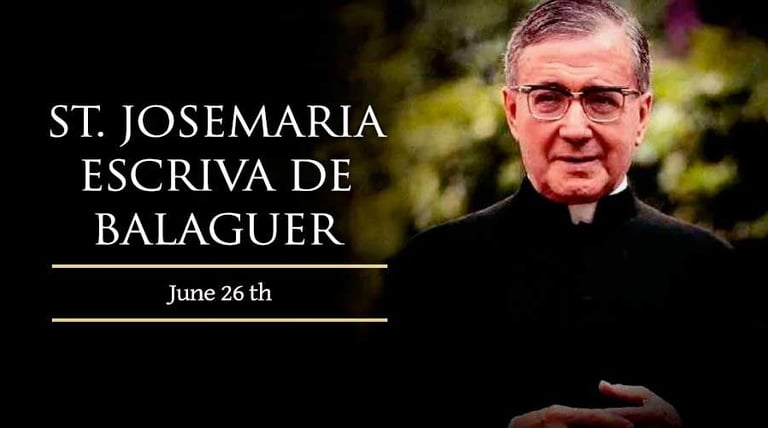Saint of the day June 26, 2025
St Josemaria Escriva
DAILY SAINT
Nirmala Josephine
6/26/20253 min read


On June 26, the Catholic Church commemorates the life of Saint Josemaría Escrivá, priest and founder of The Prelature of the Holy Cross and Opus Dei.
He was born in Barbastro, Spain on January 9, 1902 into a pious family. When he was young, he one day saw bare footprints left in the snow by a monk. The small sign left a great impression of holiness on the young man that would begin to guide his life and foster a vocation to the priesthood.
He developed a prayer life intensely centered on the Eucharist during his priestly studies in Logroño, and also cultivated deep devotion to Mary. “The Blessed Virgin has always helped me to discover her Son’s desires,” he said, and would often pray for her to ask God to reveal his will to him.
On March 28, 1925, Josemaría was ordained to the priesthood. During his early ministry, he worked among a variety of people, including children, students, artists, and workers, while also teaching law to help support his mother and sister.
Three years later, while on retreat, Josemaría saw the mission God intended for him, that of opening up a new spirituality and vocational path for the laity in the form of Opus Dei (“the work of God”). This prelature would become the central focus of his life, serving many of the unmet spiritual needs of lay people at the time.
The young movement began to grow quickly, attracting in particular university students. In the late 1930’s, the Spanish Civil War brought great hardships for the Church while Josemaría continued his work. His reputation for holiness, and thus his movement, began to grow in this time.
In 1946, Josemaría moved to Rome to obtain papal recognition of his movement from Pope Pius XII, which was granted the following year. Even as successive popes sent their blessings and affection, the work involved in expanding Opus Dei took a toll on Josemaría. Nonetheless, he is said to have never stopped smiling.
Josemaría welcomed Pope John XXIII’s calling of the Second Vatican Council. His work in expanding the way to holiness for lay persons was seen by the Council Fathers seen as a precursor to Vatican II’s renewed focus on the life of the laity. He worked swiftly to implement the Council’s decisions into the life and worship of Opus Dei.
In the latter years of his life, Josemaría traveled throughout the world to catechize his organization, often drawing crowds of thousands.
On June 26, 1975, Josemaría died in his workroom of a heart attack. The last thing he ever looked upon was an hanging icon of Our Lady. At his death, Opus Dei was present on all inhabited continents, numbering over 60,000 people from more than 80 nationalities.
Reflection
In a homily from 1967, Josemaria states his spirituality in clear terms: “…God is calling you to serve Him ‘in and from’ the ordinary, material, and secular activities of human life. He waits for us every day in the laboratory, in the operating room, in the army barracks, in the university, in the factory, in the workshop, in the fields, in the home and in the immense panorama of work. Understand this well: there is something holy, something divine hidden in the most ordinary situations, and it is up to each one of you to discover it.”
In other words, there is no need for a serious lay Catholic to abandon his work and routine, his family life, or his everyday relationships to fulfill God’s will. God is found in and through ordinary life. Cardinal Albino Luciani, later Pope John Paul I, perceptively noted that Saint Josemaria was not teaching a ‘spirituality for lay people,’ as Francis de Sales taught, but a ‘lay spirituality.’ It is not a question of praying the rosary while sweeping the floor, or contemplating scripture while driving. It is about “materializing” holiness by converting ordinary, well-done work into a sacrifice and prayer to God. Ordinary work, then, is not just the context, but the raw material, for lay holiness. All jobs are important. Daily life is not a distraction from God’s will for us. Daily life is God’s will for us. When we get to work we get to God.
